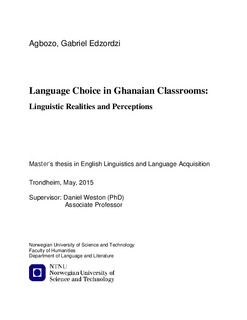| dc.description.abstract | English and Ghanaian indigenous languages are employed at different levels of education as mediums of instruction and are taught as subjects in Ghanaian schools. This study explores this linguistic situation using data from interviews and recordings of classroom interactions in a Junior High School located in the predominantly Ewe-speaking community of Sogakope in South-Eastern Ghana. Employing a combination of language contact theories in sociolinguistics and the ABC Model of attitudinal study in social psychology for the analysis of data, we present the language choices made in this classroom as well as the pragmatic factors that influence these choices, participants’ attitudes, and how participants’ choices and attitudes could inform language-in-education policy in Ghana. The outcomes of the study show that students’ lack of competence in English and the linguistic gaps in Ewe are the pragmatic factors that influence language choices in this classroom and that code-switching is the main medium adopted to cater for these linguistic challenges. Furthermore, all participants have positive attitudes towards English as medium of instruction and as a subject of study because of its utilitarian function, and to code-switching as medium of instruction because it aids in lesson comprehension but they have negative and ambivalent attitudes towards Ewe as medium of instruction and as a subject of study respectively because it has low aspirational function. The study suggests that there should be a distinction between ‘medium of instruction’ and ‘medium of classroom interaction’ (Bonacina & Gafaranga, 2010) in order to put premium on students’ needs as the basis for language-in-education policies; that Ghanaian indigenous languages are made compulsory subjects of study from primary school to the Senior High School level and that competence in at least a Ghanaian indigenous language be made a condition for employment in Ghana to give a strong aspirational function to Ghanaian languages as well as trigger positive attitudes towards these languages (Owu-Ewie & Adu-Buandoh, 2014). | nb_NO |
